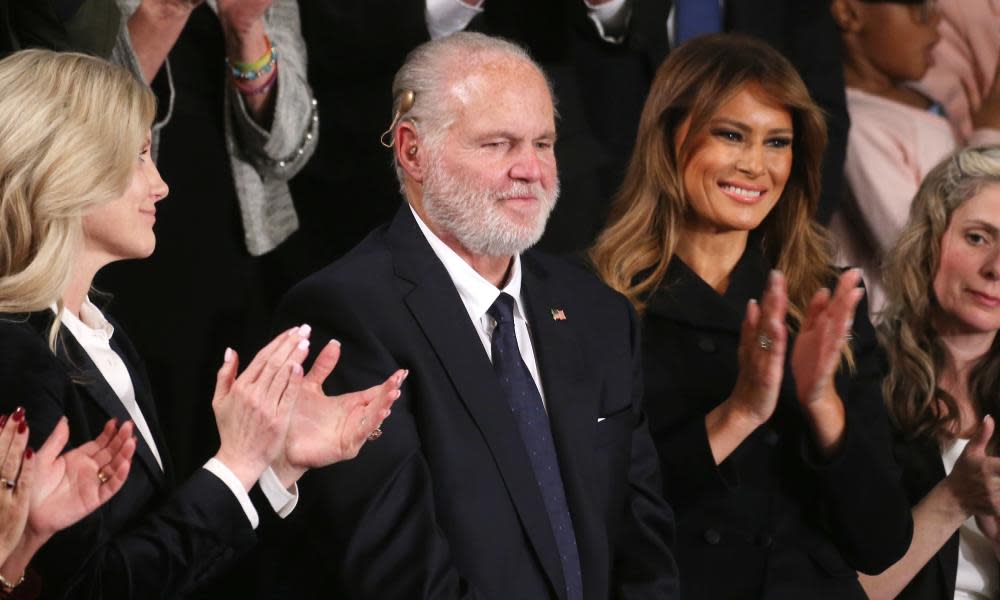Rush Limbaugh: coronavirus a 'common cold' being 'weaponised' against Trump

The coronavirus outbreak is being “weaponised” by the media to bring down Donald Trump when in fact it is simply a version of the “common cold”, the conservative radio host and presidential medal of freedom recipient Rush Limbaugh claimed on Monday.
Related: What is coronavirus and what should I do if I have symptoms?
His comments were widely condemned: more than 80,000 people are known to have contracted the virus worldwide and 2,700 are known to have died. Authorities are struggling to cope in China, Iran, Italy and Tenerife.
The World Health Organization has not yet declared the outbreak, which originated in China, a pandemic.
On Tuesday, Professor Mary-Louise McLaws, an infection control expert who has advised the WHO, told the Guardian: “Part of the reason for declaring a pandemic, if they do declare one, would be to get the critical mass on board to take it seriously and not ignore symptoms, and to get the finances required to help tackle and control it.”
There are more than 50 known cases in the US, subject to quarantine. In India on Tuesday, Trump downplayed stock market falls in response to the outbreak, praised China for its response, and said coronavirus was “a problem that is going to go away”. But on Monday, his administration asked Congress for $1.8bn to boost its own response.
Limbaugh’s conspiracy theorist take is that the outbreak is being used by the media to discredit a president who earlier this month honoured the rightwing shock jock during the State of the Union address.
“It looks like the coronavirus is being weaponised as yet another element to bring down Donald Trump,” Limbaugh said on his Monday show. “Now, I want to tell you the truth about the coronavirus. I’m dead right on this. The coronavirus is the common cold, folks.
“The drive-by media hype of this thing as a pandemic, as the Andromeda strain, as, ‘Oh, my God, if you get it, you’re dead’ … I think the survival rate is 98%. Ninety-eight per cent of people get the coronavirus survive. It’s a respiratory system virus.”
Limbaugh has used his platform on talk radio to campaign to attack liberals, often causing controversy with extreme rightwing views on abortion, feminism and race.
Earlier this month, he revealed that he has advanced lung cancer.
According to the Guardian’s guide to the coronavirus, it “can cause pneumonia. Those who have fallen ill are reported to suffer coughs, fever and breathing difficulties. In severe cases there can be organ failure. As this is viral pneumonia, antibiotics are of no use. The antiviral drugs we have against flu will not work. Recovery depends on the strength of the immune system. Many of those who have died were already in poor health.”
Limbaugh said: “It probably is a ChiCom laboratory experiment that is in the process of being weaponised.”
That was a reference to a baseless theory spread in the US by figures including a Republican senator, Tom Cotton of Arkansas, that the coronavirus may have originated in Chinese biological weapons research.
In the US, Limbaugh claimed, “the way [coronavirus] is being weaponised is by virtue of the media, and I think that it is an effort to bring down Trump, and one of the ways it’s being used to do this is to scare the investors, to scare people in business.
“It’s to scare people into not buying Treasury bills at auctions. It’s to scare people into leaving, cashing out of the stock market – and sure enough, as the show began today, the stock market – the Dow Jones Industrial Average – was down about 900 points, supposedly because of the latest news about the spread of the coronavirus.”
The Dow fell by 1,000 points on Monday, its worst fall in two years.
The media’s response to the coronavirus story has indeed attracted criticism for sensationalism and stoking public fear.
Speaking to Time magazine earlier this month, for example, Rutgers journalism professor Steven Miller said: “It’s just amazing how quickly word about this [coronavirus] has spread, the intensity of the coverage. It seems to me that the coronavirus is being covered in more sensationalistic terms than Ebola in 2018.”

